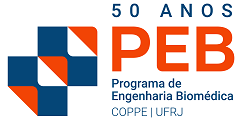Does UFRJ offer an undergraduate Biomedical Engineering program? If not, where can I find one?
No. UFRJ does not offer an undergraduate Biomedical Engineering program. This undergraduate degree is still very new, and is offered by few Universities. A consultation to the Brazilian Biomedical Engineering Society website may help locate such undergraduate programs.
Does PEB perform EEG, ECG, US, Biomicroscopy or other medical tests? Where are biomicroscopy tests offered?
No. We do not perform any medical tests. We are a graduate program and help develop new equipment and techniques, but we do not offer medical tests. Please ask your doctor about locations where these tests are available.
Do I have to return received scholarships if I withdraw from, drop or fail courses? Is there a minimum performance needed to keep my scholarship
-This is decided on a case-by-case basis. As of September 30th, 2010, for instance, CNPq regular quote scholarships must be returned under some conditions (item 4.3.2c in RN-017/2006 Annex IV). We recommend you read the regulations for each scholarship to know more about rules and your rights and obligations. To do that, please visit the page of the funding agency CNPq, CAPES ou FAPERJ and check the regulations that apply to your scholarship
I am a student from outside PEB. Can I attend the courses? What do I have to do to attend a course as an auditing student? What are the consequences of this situation? How does this interact with scholarships and the student transcript? Do you provide a declaration of attendance, and may attendance as an auditing student later be used as credits if I enrol in the program?
If you are a student at UFRJ, you may apply for our courses. If you are from outside UFRJ, you must contact the professor responsible for the course and the academic coordinator and explain your situation. To attend a course as an auditing student, please contact the professor responsible for the course and the academic coordinator (you will not be allowed to take the exams and cannot use your attendance as an auditor as credits later – an auditor does not count as a student).
What is the difference between a full-time and a part-time work regime? Can I change my work regime after the registration?
Full-time students will be at PEB daily, participate in all courses in each period, may have a scholarship, cannot work, and have an exclusive commitment to the program. The work regime may be changed at any time. However, if this change involves scholarships being granted or cancelled, the student must verify the regulations for the scholarship in question to find out the implications of such a change.
Must the documents provided be certified beforehand, or can they be certified at the time of the registration?
Documents used internally for Application may be certified at the time of the registration.
Where do the selection examinations take place?
The examinations take place in the Program’s facilities, at rooms 328, 330 and 332, near the Secretariat.
Are scholarships guaranteed for students selected for the program?
No. There is a scholarship quota for the students with the best scores in the selection examination. The granting or maintenance of scholarships will depend on the student’s performance; students may also be removed from the program after the end of each term if their performance is unsatisfactory.
Where can I work as a Biomedical Engineer?
There is no specific job market for biomedical engineers. We do not offer undergraduate degrees. Ours are graduate programs (which may be understood as specializations). You can only work in jobs allowed according to your undergraduate degree. A Master’s or Doctorate degree will allow you to pursue an academic career in research, or you may use your degree as an edge when seeking a position in the job market, especially in areas combining health and engineering.
What degree will I receive after completing the program?
Master in Science (MSc) or Doctor in Science (DSc) in Biomedical Engineering.
How can I obtain a letter of acceptance?
Letters of acceptance for covenant students (PEC/PG; TWAS; etc...) may only be obtained after approval of the student’s Project in the PEB’s collegiate council. For this to occur, the candidate must find an advisor, and define the theme for the thesis or dissertation along with him (her). The candidate must then write a project under the supervision of his (her) future advisor. This is the project that must be submitted to PEB’s collegiate council for approval. This entire process is usually long (taking some months until its conclusion). It is recommended that candidates seek out their future supervisors and write their project in advance.










